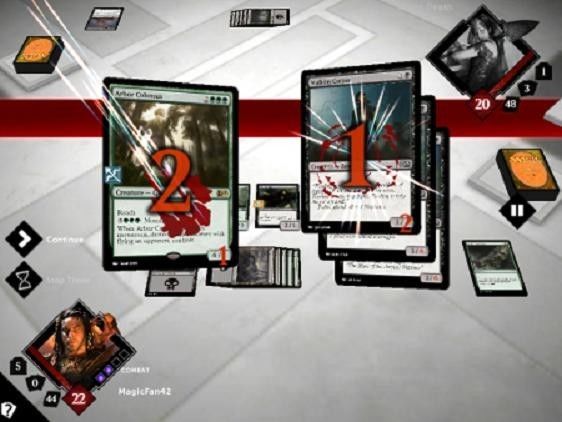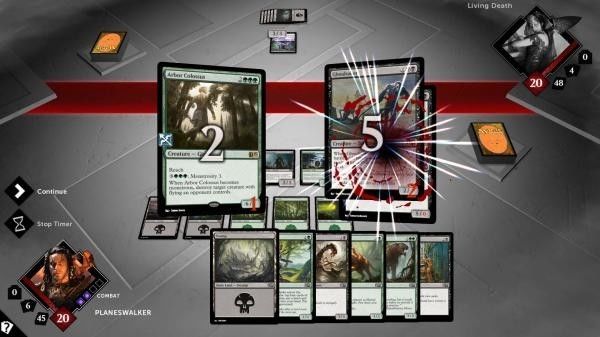When I was younger I was never into Magic: The Gathering. I dabbled briefly in Dungeons and Dragons at one point, but it was mostly football stickers and Pogs that captured my young and impressionable imagination as far as collectables were concerned. When the Magic: Duels of the Planeswalkers videogame series launched in 2009, I - much like many other humble newbs - was afforded the chance to learn the ropes. Sure, I understood fine well that the mechanics had been slowed down and the rules simplified for my ignorant benefit, but it was all done in such a way where I never felt patronised. Quite the contrary, I felt entirely included, and began to appreciate what I’d missed out on all those years ago. After scratching the surface, I in turn began to appreciate the immense level of depth these games harnessed.
 |
| Consider each card's elemental or mechanical perks |
Considering how popular Hearthstone has become over the past few months, here would have been an opportunity for the Duels of the Planeswalkers series to really open itself up to even more would-be recruits and capitalise on its competitors success. This could be perhaps considered dodgy tactics, however when dealing with what was at one time such an inclusive community, surely cracking the door that wee bit more would be considered a victory. What Magic 2015: Duels of the Planeswalkers instead has opted do is maar any perceived digital progress the card game has made by forcing some pretty hideous microtransactions into its makeup, thus restricting almost all aspects of the game.
Taking control of a wizard, the player must utilise magic and monsters, summons and enchantments, as they lock horns with other card-wielding enchanters. Divided into five colours, all of which represent mechanical or elemental power, land cards must be laid first and act as the foundation to lay forth monsters for battle. There are a myriad of combinations at the player’s disposal and, as both players start with 20 health points, each game becomes a test of strategy and cunning as you each avoid hitting zero.
 |
| Lay land cards before going in for the kill |
Beneath the largely lacklustre surface aesthetic this time round, lies Magic’s excellently designed rule system and, like the rest of the Duels of the Planeswalkers entries, a thorough tutorial ensures beginners get on board from the outset. Yet almost immediately following this soft entry, Magic 2015 plays its least appealing card: microtransactions. After being forced to start with a pick-n-mix starter deck, the player can eventually accrue booster packs from winning AI battles before gathering enough cards to enter the game’s deck creator - a first for the Planeswalker series.
Here, instead of engineering the game towards limitless customisation, players have two options: grind - and I mean grind - for as long as they can possibly stand, filtering out dud cards or equally as frustrating weak monster doublers; or open your wallet to bypass the whole ordeal. The player’s reward for perseverance is the ability to mix and match card colours into hybrid ensembles, which can be then used to unleash varied and intricate strategies upon their foes. In this case, however, the means do not in any way justify the ends.
At £1.50/$2.50 for ‘premium’ booster packs, £3/$5 per plane, and £14/$24 for the entire lot, it doesn’t take long for the realisation to set in that what Magic 2015 lacks in innovation and scope, it more than makes up for in cynical monetisation. To make matters worse, some of these booster packs can only be accessed by shelling out, meaning to actually ‘enjoy’ the entire Magic 2015 experience you must draw from your wallet, as well as your deck.
 |
| Defeat your foe's monsters, then your foe |
Aside from the game’s awful microtransactions, Magic 2015 also fails to expand the good work laid by its predecessors. Aside from incorporating three and four player modes, many series classics such as 2014’s ‘sealed play’ and 2013’s ‘planechase’ mode have been scrapped. What’s more, the ‘two-headed giant’ competitive mode is missing, and beating bosses to unlock themed decks in single-player is absent, leaving Magic 2015 feeling awfully linear and devoid of not only imagination, but substance.
Don’t be fooled by Magic 2015: Duels of the Planeswalkers’ base price of £7/$10, you’re nowhere near a full game from this starting point. Aside from the odd moments where Magic’s innovative ruleset is allowed to shine, this entry feels like a complete cash-in, forcing players to rely on their wallets, not their wits. Long term Magic fans will want to avoid Magic 2015 to avoid utter frustration, whereas newcomers should look further into the Duels of the Planeswalkers’ back catalogue for a more appropriate and fulfilling platform for inauguration.
TOP GAME MOMENT
The rare occasions where previous Planeswalkers iterations shine through.




